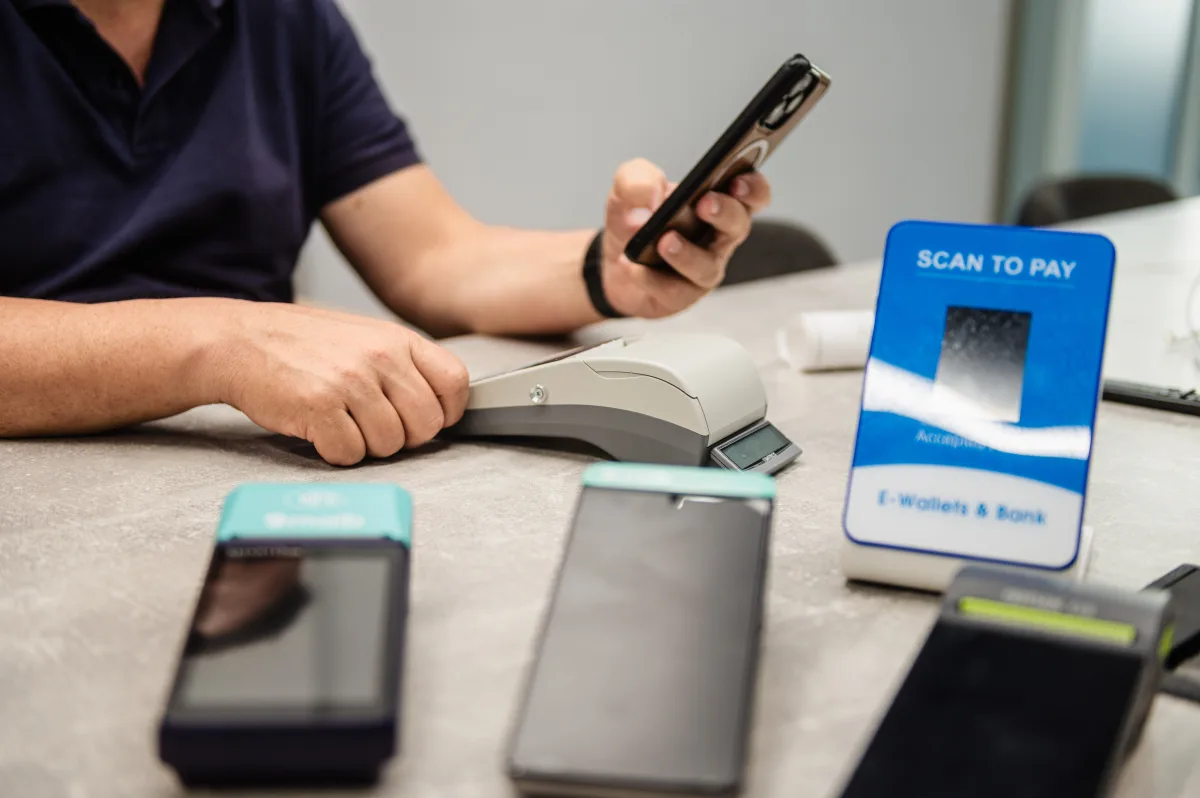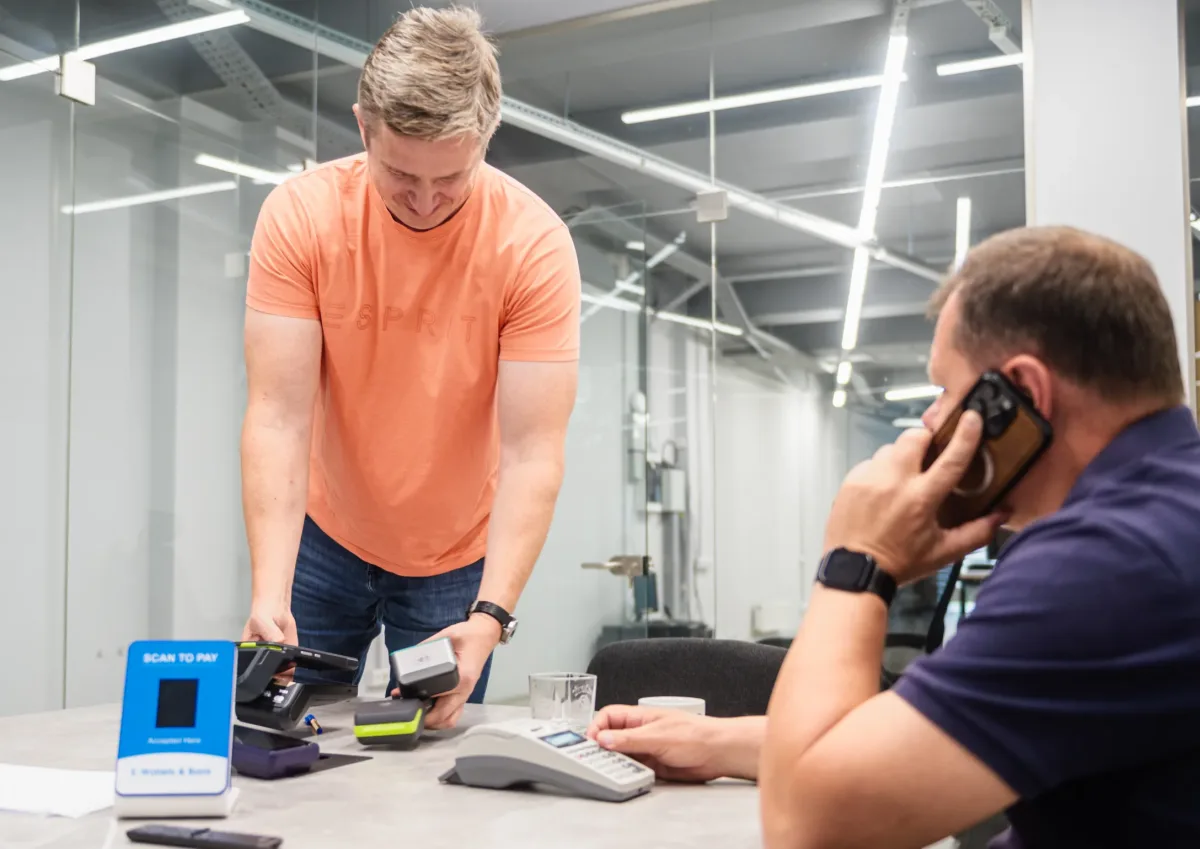Click to approve. Swipe to pay. Confirm with a fingerprint. That’s what most fintech looks like on the surface. But some Moldovan start-ups are building a future where software talks to software. Finergy, for example, was founded by two engineers who knew Moldova’s banking system inside out. It is just one of several start-ups helping banks and merchants move to a world of programmable, instant payments.
Before founding Finergy Ghenadie Cernei, an economist by training, spent years trying to modernise banking systems from within.
As director of digital transformation at MAIB, a Moldovan commercial bank, he helped introduce contactless payments and led key upgrades in backend infrastructure.
After 30 years in the system, moving from developer to security lead and then to director, Cernei left. “The conditions were great,” he says. “But I started to lose perspective.” He stopped seeing things with fresh eyes, he says, and accepting them as they are.
The desire to do more drove Cernei to look elsewhere. When he and his friend, software engineer Maxim Burdiean, teamed up in 2023, they weren’t trying to compete with banks. “We realised we were solving the same problems over and over,” Cernei says. “Just on opposite sides of the wall. We realised: banks need tools they can’t build from scratch. We weren’t betting on product-market fit. We knew the market. The real question was: can we deliver what it needs?”
At the Startup Moldova Summit in spring 2025, Burdiean stepped on stage not to pitch another wallet or superapp, but to present a vision for the infrastructure behind instant payments.
The company, he explained, is designed to help banks and fintechs process real-time transactions. He spoke without resorting to slogans. In this field, clarity and depth often matter more than pitch decks. Burdiean had never worked in a bank. But through his company, he maintained MAIB’s entire mobile app stack on both iOS and Android, solving bugs and rewriting middleware.
“I saw everything up close,” he says.
Timing matters. In 2024, Moldova launched MIA, its first national instant payment system, supported by the National Bank of Moldova (NBM) and USAID. Over 700 companies activated the new payment options within just three months of its launch. By 2025, Moldova had joined the Single Euro Payments Area (SEPA), making instant payments cross-border and programmable.
Faster than cards, friendlier than cash
Finergy’s core product, miaPOS, works behind the scenes to move money the moment it’s needed. No clicks, no waiting. Instead of relying on someone to press ‘pay’, it lets systems talk to each other directly. A chatbot, a customer service tool, or a government platform can trigger a transaction as soon as a bill is issued or an order is confirmed. For the user, it feels like magic. For developers, it’s a modular engine they can plug into almost anything from city services to online stores.
Across Moldova, miaPOS is already used by small shops, service providers, and public platforms through QR codes, Pay-by-Link flows, and checkout screens where the complexity is hidden, but the experience feels instant.
Both Burdiean and Cernei use Finergy’s tools in their own lives. Cernei recalls one of his first real-world tests: “I was in Romania and needed to pay for insurance. The agent sent me a payment link on Viber. I clicked, paid, and then realised it went through our system. We’re not just building backend tools. This works for people.”
“A big bank can still afford to fix things manually,” Burdiean adds. “But for smaller players, it has to just work. The system must be self-sufficient, predictable, and secure, because no one has time to babysit infrastructure.”
Built on the globally accepted ISO 20022 standard and already integrated with SEPA, miaPOS fits directly into national and European payment rails. “Each country has its rails,” Ghenadie says. “MIA in Moldova. IRIS in Greece. Blik in Poland. Europe is moving toward unifying them. We’re already part of that logic.”
The company has also built a remote identity verification system integrated with Moldova’s national ID database. That is something foreign providers couldn’t access at the time. “We didn’t reinvent the wheel,” Cernei says. “We just connected what was needed.” The system now works via website or mobile, aligning with the latest NBM regulation for remote onboarding.

Built for Moldova, wired for Europe
Still, Finergy hasn’t lost sight of the basics. “Terminals are too expensive for some rural vendors,” Cernei says. “We want to make digital payments accessible even where card hardware can’t reach.” That’s why they’re adapting their system for Moldova’s basic cash registers, turning even a paper receipt into a QR-enabled checkout.
“The goal,” he says, “is to cover the last mile. People often ask what exactly we build. We don’t build a visible product. We build the rails underneath like electricity. You don’t think about it when it works. But everything depends on it.”
The next step? Romania. “We don’t need to localise much,” Maxim says. “Just plug in.”
Finergy is part of a larger trend: Moldovan tech companies building for export. Salt Edge helps European banks comply with PSD2. Fagura turned regular Romanians into lenders, and has passed two million euros in peer-to-peer loans.
Then, Planable and Brizy reached international users through collaboration tools and no-code web platforms. For example, Planable, featured in Forbes, was acquired by SE Ranking in 2025, a global tech firm with more than 35 million US dollars in annual revenue.
Ghenadie Cernei’s vision stretches further. He believes payment systems will soon not only serve humans, but also AI-agents, software bots acting on people’s behalf. “It’s already happening in small ways,” he says. “Your phone adjusts photos. Why not have an agent that knows your bills and pays them automatically when it makes sense for you?” That’s the world Finergy is preparing for.
“Imagine a personal AI-assistant that tracks your bills and spending habits, and pays automatically when conditions match your preferences: not too early, not too late, and never above your limits. We already have basic automation for that,” he says. “And once the buyer and the seller connect through programmable payment rails, agents will simply interact with each other.”
The pace of change, Cernei notes, often outstrips our ability to adapt. He gives an example he’s fond of. At first, a person thinks they’re dealing with a horse, with something manageable. But by the time they’re ready to ride, it’s already a motorcycle. Then, a helicopter. Then, a plane or even a rocket. “And you’re left wondering what to do,” he says. “But then you look around and see people who haven’t even noticed anything changed. And you think that at least you noticed the change.”
Finergy is registered within the Moldova Innovation Technology Park and is also a part of the Startup Moldova ecosystem that helps to stay connected with the local companies and demands..
The co-founders admit they can’t predict what fintech will look like in a decade. Maybe money will disappear, maybe AI will evolve on its own. For Cernei and Burdiean, the real challenge is staying agile. Each day brings a new wave, and mastering the last one isn’t enough.
It all reflects where Finergy’s mission began. Not in theory, but in hands-on experience with real systems, bugs, and bottlenecks. Now they’re building the infrastructure to move beyond it.
Maxim Burdiean and Ghenadie Cernei. All photos by Iurie Gandrabura.







